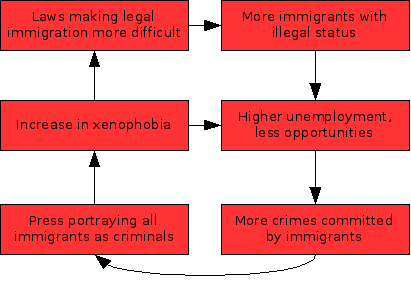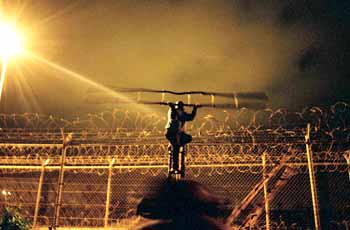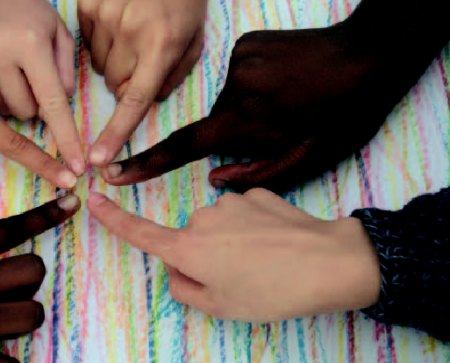We are not criminals
Disclaimer: I am Chilean, living in Italy for the last 2 months, after about 1 year living in Spain. On one hand, all the paperwork for immigration, the long queues, the chest X-Ray, the blood sample, the bureaucracy, has left me bitter, but I must admit that immigrating to Chile is not easier, as several Europeans that live in Santiago have told me they got basically the same "treatment" I got here. On the other hand, European people here have been in general very welcoming, both inside and outside the university, and have received me in their hearts, homes and also at their tables, which is certainly a bless here in Italy :-)
Having said that, I am increasingly concerned about one particular topic: an increasing feeling of fear and anger against foreigners, fueled by mass media, politicians, the society in general and sadly, also by the immigrants themselves. Fueling anger and hate is a very dangerous path to follow, and through history we have seen the consequences of a demonizing discourse only when it was too late to do something about it [see for instance Wikipedia: Antisemitism].
What says the press about immigrants ?
Let's look at 10 days at the end of November, 2005. I searched different news sources on the web using the terms "Latino", "African", "gang", "illegal", etc. This is a sample of what I found, day by day:
|
November 21-30, 2005 |
|
|
Nov. 21 |
"A total of 17 people were arrested by the Civil Guard [in Spain] last week in a crackdown on a Latin American gang" [Typically Spanish] |
|
Nov. 22 |
"Asian gang members who boasted they had killed a white man have been found guilty of murder" [BBC] |
|
Nov. 23 |
"... an immigrant from the Ukraine, was arrested and charged with home invasion, armed assault in a dwelling and armed assault with intent to murder" [AndoverTownsMan] |
|
Nov. 24 |
"A man was found guilty at a London court Tuesday of the Islamic 'honor killing' of a man who had a secret relationship with his sister" [Daily Times] |
|
Nov. 25 |
[A gang assault a bar] "Minutes before the robbery, a woman saw three men, with caps and dressed as the attackers, by the bar. They spoke a foreign language among them" [La Verdad (in Spanish)] |
|
Nov. 26 |
"Hernandez Soto, an illegal immigrant from Mexico, was charged with second-degree murder" [Centre Daily] |
|
Nov. 27 |
"A foreigner was recently handed a sentence of 18 months imprisonment, two strokes of the cane and a fine of $1,500" [Brunei On line] |
|
Nov. 28 |
"An illegal immigrant may use your social security number (SSN) and date of birth (DOB) for employment purposes or to obtain a birth certificate" [Directions Magazine] |
|
Nov. 29 |
"[T]hey [center-right politicians] suggested that large, polygamous, African families were one of the main causes of three weeks of rioting" [The Independent] |
|
Nov. 30 |
"An Italian woman of 38 years, married and mother of two sons have been raped by a North-African" [Quotidiano Nazionale (in Italian, emphasis in the original)] |
Of course, the goal of the press is not to keep us informed. Their goal is to sell newspapers and advertising, so they'll publish what sells the most. Currently, the press shows every day crimes committed by immigrants. In Spain it was personally painful because they have two large immigrant communities: Moroccans and Latinos, with Moroccans being the most marginalized community and Latinos in a strong second place. Recognizing the historical background for the animosity against Moroccans in Spain, it is ironical to note that among Muslim countries, they are the country in which the largest majority of people condemns violence against civilians [PEW Research, 2005]. Here in Italy the "enemy" are Eastern Europeans, and in other countries I think the "enemy" varies: probably the largest foreign community is always considered as a threat.
I don't think the press lie when they report crimes involving immigrants, don't get me wrong. But I think there is a systematic bias against immigrants, and the press shows them only when they are criminals, for instance in the US, "despite the enormous growth of the nation's Latino community, Latinos continued to be marginalized on the evening newscasts of ABC, CBS, CNN and NBC in 2002 ... less than 1 percent (0.75) [of the stories] were about Latinos ... two-thirds of all Latino-related stories that aired on the network news were about crime, terrorism and illegal immigration." [National Association of Hispanic Journalists, 2003]. Some times, even the press talks about "suspicion" that a certain crime was committed by foreigners, but if that turns out not to be the case, they do not correct their statement later. Could this have an economic motivation, as stories about violent immigrants sell more? It could be, according to some: "News and the entertainment media have reinforced these anxieties by seemingly adhering to an unwritten rule that the only Latino stories worth telling are about troubled youths or the people who strive to steer them straight" -- [L.A. Times, 1996].
This is just a matter of fear and misunderstanding. People have always feared the different, and all minorities (sexual, racial, linguistic, etc.) have always been looked at with suspicion. Xenophobia, racism, religious intolerance was the cause of the death of millions during the XX century and in the present. A recent study by the Congressional Budget Office found that the negative effect of migrants on the wages of unskilled Americans was less clear, and probably lower, than people imagine: it reduced them by something between zero and 10%. [Economist, 2005]
The following picture is a caricatured, but in my opinion, accurate view of the image that some groups are trying to sell:

There are, of course, many different approaches to immigration. For instance USA and Japan might be both super powers in the economic sense, but USA was built by immigrants but Japan has been a more monocultural society for ages. Also, some countries are activelly inviting qualified immigrants (such as Canada) because they have reasons to do so, while other countries are very exposed to immigration for geographic reasons (such as the USA) and do not want to. It is easy for one country to criticize others for their approach. Countries in the north of Europe may show more openness as they receive less immigrants, while "border countries" in Central and Eastern Europe may be more reluctant.
But in general, Europeans, North-Americans, Australians, Japanese and all the citizens of the rich countries know little about the less-developed ones. Tourist agents in Chile have told me that foreigners are very surprised to see buildings there. Europeans only hear news about South America when significant cases of political corruption are unveiled, about Africa when there are major armed conflicts, and about Asia when there is a natural disaster, while the media remains "centered in national news, with the paucity of international news often portraying only disasters" [Baeza-Yates, 2005]. This further helps in creating a bad image about foreigners, and illiteracy in geographical matters only adds to the problem: "about 11 percent of young citizens of the U.S. couldn't even locate the U.S. on a map" [National Geographic, 2002]. Foreigners are an easy target in a context of ignorance: "in the latest twist, immigrants are now even accused of being bird flu carriers" [Letters to the Financial Times, 2005]. Geographic literay is very important as the world is becoming more networked. 200 years ago if you lived in Latin America it was almos 99% sure that you will never meet a person from China during your life. Now, it is almost sure that it will happen, and this is valid for most of the world. We have to prepare our children to interact with people from different cultures.
One possible explanation for the comeback of isolationism is, of course, September 11, 2002 and the "War on Terror" which in the name of "Homeland Security" has directed the anger of the public to immigrants, further increasing fear and thus racism and xenophobia [National Network for Immigrant and Refugee Rights, 2004]. Tram Nguyen, author of "We are all suspects" writes about the US government policy on immigrants after September, 11: "There was almost a PR benefit, too, being able to say, 'We are doing something about national security,' and these are the easy targets to get. It was a calculation in terms of being able to show that you're doing something about homeland security and going after the people that you could round up the most easily and show the most arrests and process them in a system that doesn't have a lot of judicial protections" [Mother Jones, 2005]. Recently, the European Commission presented ahandbook on integration which stressing that integration is a shared responsibility, also acknowledges that the media "plays an important role in providing balanced reporting and informing the public's attitudes towards newcomers".
Though immigration policies
In developed countries, politicians at both ends of the political spectrum compete to show who is tougher on immigration [LA Times, 2005]. Laws making legal immigration more difficult have side effects, and just generate more immigrants with illegal status, meaning more marginalization and increased crime rates. The worst thing is that propagating the idea that immigrants are criminals can be a self-fulfilling prophecy. "If more surveillance over immigrants is justified, the levels of detention increase for them, which creates a new proof of their level of criminality, which justifies, in turn, more surveillance". [Nodo50, 2002 (in Spanish)]. This is a depiction of a part of the vicious circle:

Making legal immigration more difficult has other costs. In most areas of sciences, foreign students are an important part of graduate studies programs in developed countries, reaching even 55% of those pursuing a PhD in physics. Tougher immigration policies have affected negatively the enrollment of foreign students in U.S. universities "it appears that about 20% of admitted foreign students were at least initially prevented from attending in the fall of 2002 ... in percentage terms, Chinese, along with middle eastern students, felt the greatest impact. Many departments report major effects on course enrollments, and on their ability to fill openings" [American Institute of Physics, 2002]. This is not limited to physics and has been reported in other areas of science; for instance, in chemistry "immigration policies implemented in the wake of 9/11 have restricted the ability of students and scientists to visit the U.S. and could have significant unintended consequences that will undermine our future science and technology competitiveness" [Chemistry.org, 2004]. Recognizing the need for having immigration policies that help promote science, the IEEE has formally requested the US government to "take appropriate actions to streamline and improve the U.S. visa processing system to eliminate unnecessary delays and allow for priority processing of visitors entering the United States for mutually beneficial educational, scientific and technical collaborations" [IEEE-USA 2004].
The civil liberties of the own inhabitants of a country are also threatened by irrational immigration policies; recently "a teenager was held for two weeks after cops wrongly accused him of being an illegal immigrant" [IC South London, 2005]. In Italy it is required to show an identification to enter an Internet cafe, and operators must use software to record all the activities of their customers "The software saves a list of all sites visited by clients, and Internet cafe operators must periodically turn this list into their local police headquarters" [Christian Science Monitor, 2005]; an identification is also required to use a telephone at a call center, and by 2006 people buying a card for a pay phone will be required to show an identification that will be recorded along the serial number of the phone card for tracking purposes. The presumption of innocence, this is, that a man is innocent unless he is proved guilty, is being challenged in these times and we risk turning our countries into police states.
In 1989, most of the world celebrated the fall of the Berlin Wall; 16 years later, politicians continue to believe that a strong fence makes good neighbors. In some parts of the border between Mexico and USA a tall fence is in place, and there are proposals for extending it; fortunately the current administration is concerned about the economic costs and "argues that a Berlin Wall-style barrier would be a huge waste of money" [Usa Today, 2005]. At the border, the infamous 'coyotes' are making money out of the barriers that are in place and people are dying "412 illegal migrants died attempting to cross into the U.S. from exposure to the southwest desert, drowning in rivers and canals and from suffocation in truck and rail cars" [Bloomberg, 2005]. In the Spanish enclaves of Ceuta and Melilla, "14 African men were killed recently when the immigrants tried to storm the fences" [UPI, 2005].


Fences pictures from [Take-A-Pen, 2005]
Towards a solution
Real multiculturalism, in terms of real acceptance instead of just tolerance, is hard to understand. Tony Blair said: "I never know, although I use the term myself occasionally, quite what people mean when they talk about multiculturalism" [BBC, 2004]. Multiculturalism is a way of managing cultural diversity, ensuring that "all citizens can keep their identities, can take pride in their ancestry and have a sense of belonging" [Canadian Government, 2004]. While immigrants must respect the laws of the countries that receive them, and have the first obligation of integrating themselves into the society, expecting that they will pretend they are not immigrants by adopting all the customs of the receiving country is absurd. Countries can profit from cultural diversity. Of course, they do not have to accept immigration, but closing the borders may lead to loosing many oportunities.
In the United States there are 11 million people living illegally, and nobody honestly believes that a significant fraction of them will be ever deported. Harry Reid, Senate Democratic leader proposes to close the gap between immigration laws and reality, and recognizes that without sensible legislation "illegal immigration will not stop and the situation on the border will continue to be chaotic" [Associated Press, 2005].
In Europe, while the televisions constantly shows people arriving in small groups in rickety boats, about half a million illegal immigrants enter every year the EU by plane, bus or train, and just stay when their visas expire [The Economist, 2002]. As Europeans are living longer and having less children, immigrants are an opportunity, not a threat. Kofi Annan has said: "All countries have the right to decide whether to admit voluntary migrants. But Europeans would be unwise to close their doors. That would not only harm their long-term economic and social prospects. It would also drive more and more people to try and come in through the back door" [United Nations, 2004].
Most immigrants are honest, hard working people who just want to be treated decently. You will not solve the immigration problem by building taller fences protecting the haves from the haves-not. That is as morally wrong as useless. This world is becoming slowly one world with many cultures and our descendants will judge us on how we managed to make this transition.

Remember, always remember ... all of us are descended from immigrants and revolutionists --Franklin D. Roosevelt
Acknowledgments
Thanks for the comments and constructive criticism to: Bárbara P., Bruno E., Eefke V., Gaby M. and Raymond W., who obviously have their own, independent, opinion on this subject.


